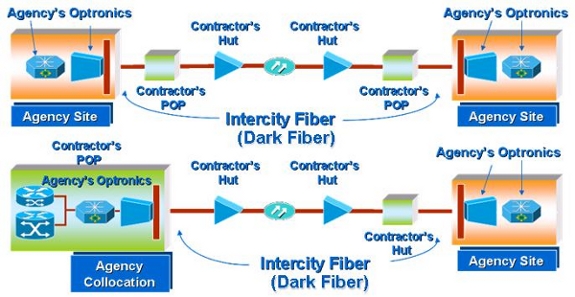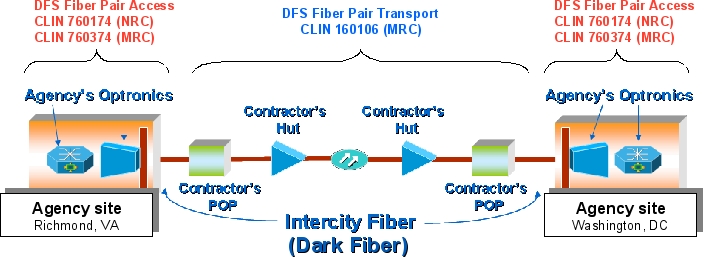A fiber cable typically contains many optical fibers, which are either "lit" to carry a signal or "unlit" to be used at a future date. A Dark Fiber is an optical fiber through which no light is transmitted. The simplest Dark Fiber Service is a point-to-point connection between two locations. More elaborate configurations (e.g. Diverse Ring, Star, etc.) enable Agencies to interconnect any number of selected locations. DFS is a new service that was not offered on FTS2001 contracts.
DFS is acquired as a facility which will allow the Agency the indefeasible right of use of the fiber route. The term fiber route could mean a fiber pair in a fiber-optic cable, or the entire fiber-optic cable.
DFS may be ordered for inter-city, intra-city interconnections in the CONUS and OCONUS with Non-Domestic locations being optionally offered. The Agencies have the option either to provide their own optoelectronics equipment or to obtain optoelectronics equipment from the contractor. DFS is delivered to the customer-specified Service Delivery Point (SDP). The Agency can order DFS that will connect to and interoperate with:
The diagram below illustrates a CONUS wide contractor's DFS transport network delivering available optical paths to the Agency between two cities. Collocation capabilities are available from the contractor to host Agencies' optoelectronics if required. Collocation capabilities include the capability to add/drop traffic (gateways) and to regenerate and amplify traffic where needed.

The SDP for DFS is where the Agency has installed its optoelectronics. The Agency determines the specific location of the Service Delivery Point (SDP) for the contracted DFS route(s). The SDP can be either a fiber patch panel at a Government location or a collocation facility.
The contractor will provide optical fiber strands as specified by the Agency that complies with the optical performance characteristics (KPIs) as in Section C.2.5.3.1.4. of the Networx contracts. Fiber types include NZDS (Non-Zero Dispersion Shifted), LEAF, True-Wave, and SMF-28 for distances less than 60 km). The fiber installed will have to work with the specified amplifier types as required by the Agency (i.e., Erbium- doped Fiber Amplifiers (EDFA), Raman Amplifiers, EDFA/Raman hybrid Amplifiers, Semiconductor Optical Amplifiers (SOA)). The Agency also determines the number of fiber strands to be supported and the number of ducts required between the connecting locations.
The Agency can specify its expected growth to allow the contractor to plan infrastructure build-up based on such forecast. The Agency is also able to specify if gateways (add/drop points in the network) will be needed and their locations.
DFS features that may be ordered include:
A complete description of DFS features can be found in Section C.2.5.3.2.1 (Dark Fiber Features) of the Networx contract.
Each Networx contractor may provide variations or alternatives to the offering and pricing for DFS. The specific details can be found within each Contractor's Networx contract files and pricing notes for DFS.
For more information on the general DFS specifications and requirements, please refer to Section C.2.5.3 of the Networx contract for technical specifications and Section B.2.5.3 for pricing.
Dark Fiber is an optical fiber through which no light is transmitted and can be later "lit" and used to carry an optical signal. DFS capacity may be purchased in single fiber strand(s) or pair(s) within a fiber-optic cable. Charges for the actual fiber or to light the fiber are not included in DFS. DFS is a service that was not offered on the FTS2001 contracts.
The MRC for transport consists of a fixed component plus a distance-dependent (per mile) component. CONUS-to-CONUS distance is calculated using the distance formula:
Distance involving OCONUS or non-domestic locations is calculated using airline miles. Note: The Networx Pricer automatically calculates the distance when given the originating and terminating locations.
Price components required for full end-to-end service for Domestic and Non-Domestic DFS:
Example: One DFS Fiber Pair

Each Networx contractor may provide variations or alternatives to the offering and pricing for DFS. The specific details can be found within each Contractor's Networx contract files and pricing notes for DFS.
For more information on the general DFS specifications and requirements, please refer to Section C.2.5.3 of the Networx contract for technical specifications and Section B.2.5.3 for pricing.